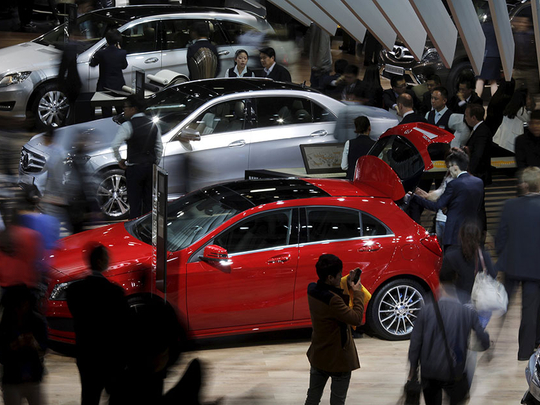
Shanghai: Global carmakers including Volkswagen, Ford and GM showed off hundreds of vehicles in Shanghai on Monday, adamant that China remains the promised land even though sales growth has hit the brakes.
At China’s premier auto show, foreign carmakers admitted an economic slowdown in the world’s second largest economy had taken its toll, but said the market was simply too big — and too important — to ignore.
China’s economy expanded 7.4 per cent last year, the slowest in nearly a quarter of a century.
“It is still growing and the market is the largest market in the world,” Ian Robertson, head of sales and marketing at Germany’s BMW, told reporters.
Vehicle sales in China reached 23.49 million last year, well ahead of the US which it overtook in 2009.
But annual sales growth halved to 6.9 per cent last year from 13.9 per cent in 2013, according to the China Association of Automobile Manufacturers (CAAM).
The slowdown continued in the first three months of this year, when sales rose just 3.9 per cent.
Among the bright spots in China is the market for SUVs (sport utility vehicles), one of the country’s fastest growing segments.
“By 2018, China is expected to be the biggest market in the world for SUVs,” John Lawler, chairman and CEO of Ford Motor China, told a news conference.
Ford is introducing seven new vehicles in Shanghai, including two SUVs and the Taurus, intended to be its flagship sedan for the China market.
But the “premier” car segment — which sells for $33,000 to $197,000 — and the even more pricey luxury market have been hit by the economic slowdown as well as a campaign lasting more than two years to crack down on corruption and government waste.
“There’s an impact from a cultural standpoint about showing off your wealth in China right now,” said Luca de Meo, member of the board of management for sales and marketing at Germany’s Audi.
“It could have an impact on the automotive business and we’re seeing it already in the high-end segment. There are less government-related purchases as well,” he told AFP.
At the show a rumoured ban on scantily clad models appeared to be in effect, with carmakers using demurely dressed attendants and dance shows to draw attention to their stands at a sprawling new venue.
Automakers, with Chinese government backing, are making a renewed push for new energy vehicles, displaying the latest fully-electric models and hybrids at the show.
Volkswagen announced plans to locally produce more than 15 new energy vehicles in China in the next four years, while General Motors (GM) will launch a plug-in hybrid version of its Cadillac brand CT6 sedan.
But the Chinese market for electric cars remains small owing to perceived problems with reliability and access to charging facilities.
Electric and hybrid vehicle sales in the country reached 26,581 in the first quarter of this year, three times the same period in 2014 but still accounting for less than one per cent of total sales, according to the CAAM.
“The government is very determined in terms of the drive for the industry’s electrification,” the president of GM China, Matt Tsien, told reporters.
“How long will it take to get there? I think it all depends on factors like infrastructure and regulations.”












